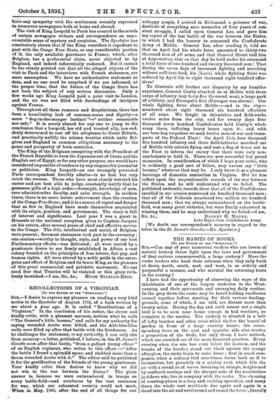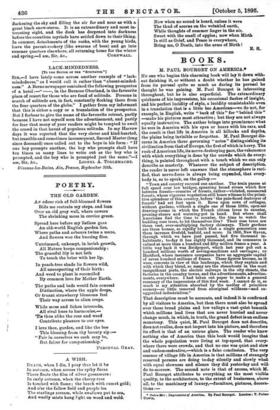THE HABITS OF ROOKS.
[To THE EDITOR OF THE " SPECTATOR."3 SIR,—Can any of your numerous readers who are lovers of natural history throw light upon the laws and government of that curious commonwealth, a large rookery ? Have the rooks leaders who head their columns when they sally forth at dawn, north, south, east, and west, in so orderly and purposeful a manner, and who marshal the returning hosts in the evening ?
I have had the opportunity of observing the ways of the inhabitants of one of the largest rookeries in the West- country, and their systematic and unvarying daily routine. In the grey dawn the rooks may be heard holding vociferous council together before starting for their various feeding. grounds, some of which, I am told, are distant more than twenty miles. During the day and until sunset not a single bird is to be seen near home (exctpt in bad weather), so complete is the exodus. The rookery is situated in a belt of lofty beeches and other trees which shelter the beautiful garden in front of a large country house; the corre- sponding trees on the east and opposite side also receive a proportion of the birds, but only those, I have noticed, which are crowded out of the more favoured quarters. Every evening when the sun has sunk below the horizon, and the trunks of the beeches stand out black against the mange afterglow, the rooks begin to come home ; first in small com- panies, when a solitary bird sometimes turns back as if to reconnoitre, but presently in a mighty rush which fills the air with a sound as of waves breaking on shingle, heightened by confused cawings and the sharper note of the numberless jackdaws who live in company with the rooks. The choosing of roosting-places is a long and exciting operation. and many times the whole vast multitude rise again and again in a cloud into the air and swirl round and round the house, literally
darkening the sky and filling the air far and near as with a great black snow-storm. It is an extraordinary and most in- teresting sight, and the dusk has deepened into darkness before the countless myriads have settled down to their liking. In summer, detachments of the rooks, with the young birds, leave the parent-rookery (like swarms of bees) and go into summer quarters elsewhere, all returning home for the winter







































 Previous page
Previous page